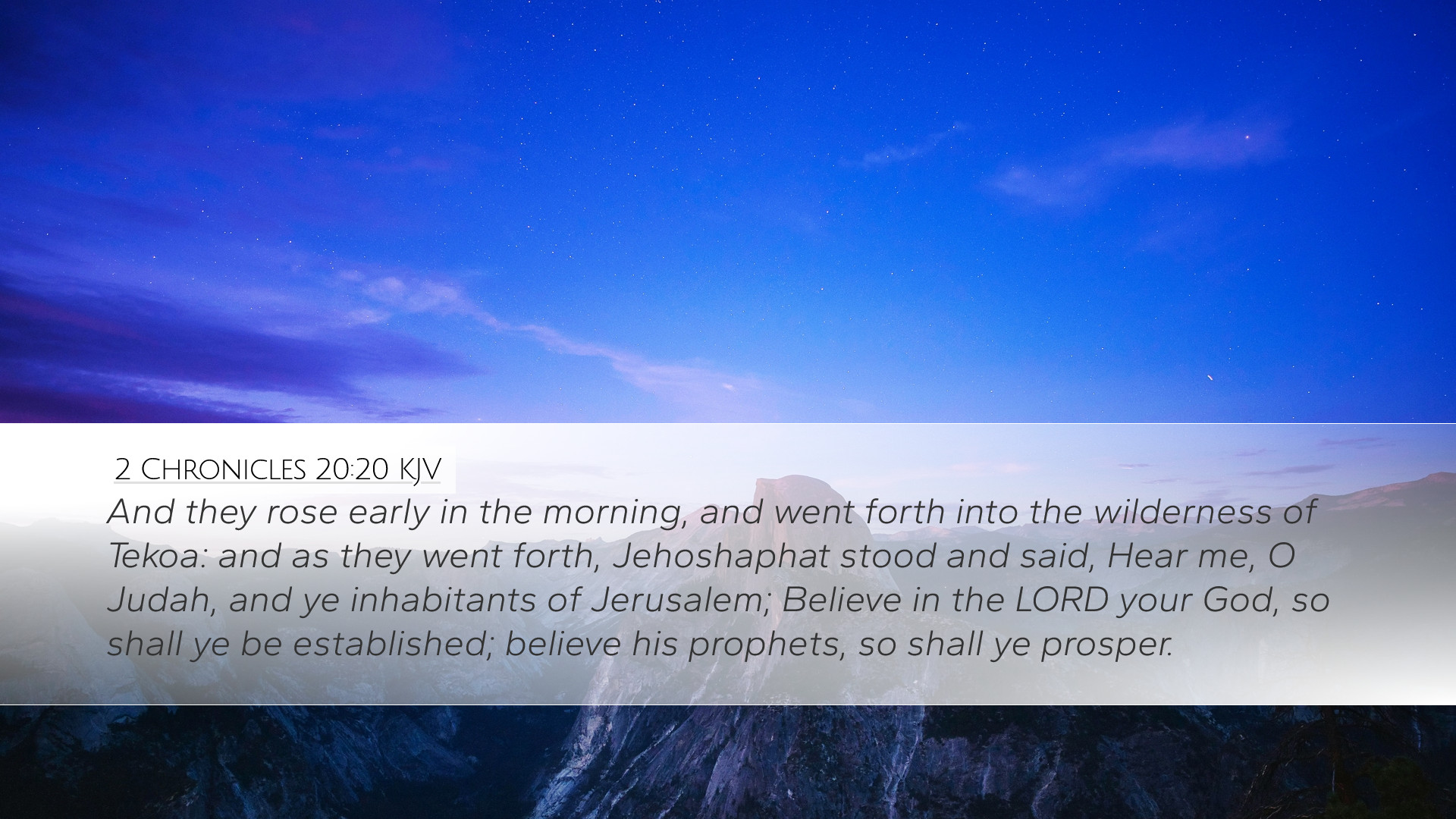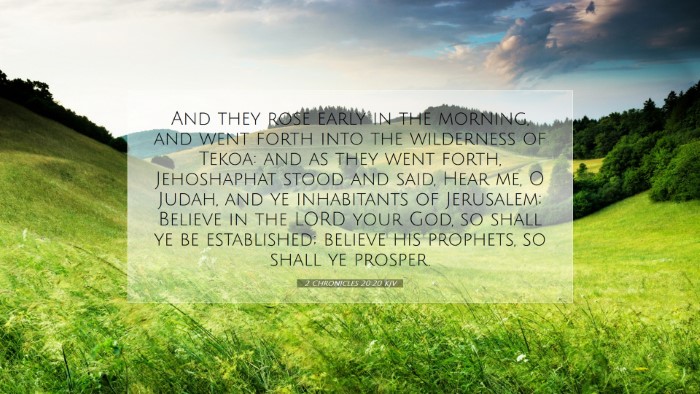Commentary on 2 Chronicles 20:20
Verse: "And they rose early in the morning and went forth into the wilderness of Tekoa: and as they went forth, Jehoshaphat stood and said, Hear me, O Judah, and ye inhabitants of Jerusalem; Believe in the LORD your God, so shall ye be established; believe his prophets, so shall ye prosper."
Introduction
This verse presents a crucial moment in the history of Judah, highlighting the faith of King Jehoshaphat and his people in the face of overwhelming adversity. The verses preceding this declaration detail the confederation of enemy nations coming against Judah, prompting a desperate plea for divine intervention. This commentary draws upon insights from notable public domain commentaries to underscore the theological and practical implications of Jehoshaphat's call to faith.
The Context of 2 Chronicles 20
The chapter begins with the alarming news of an invading enemy (2 Chronicles 20:1-2). Jehoshaphat's immediate response is one of fear and prayer, demonstrating a profound trust in God's sovereignty. According to Matthew Henry, this response illustrates a foundational principle for God's people: in times of crisis, turning to God is not just a necessity but a demonstration of faith.
Historical Background
Albert Barnes notes that the wilderness of Tekoa is a significant geographical point where Jehoshaphat musters his troops. The place serves a dual purpose: it is a canvas displaying human dependency on divine intervention and exemplifies a literal march toward battle, which represents a spiritual journey of faith.
Faith in Divine Leadership
Jehoshaphat's exhortation to the people of Judah holds critical importance: "Believe in the LORD your God." This clause presents the first step toward seeking stability amid turmoil. The word "believe" in Hebrew (אמן, 'aman) suggests a firm and steadfast trust. Adam Clarke elaborates on this term, indicating that it signifies more than mere belief; it entails a commitment to acting upon that belief in a community of faith.
The Role of Prophets
The latter part of the verse emphasizes believing in the prophets as a means to enjoy God's favor ("believe his prophets, so shall ye prosper"). The connection between prophetic authority and the well-being of the kingdom is highlighted by Matthew Henry, illustrating how adherence to God's voice through prophets is pivotal for national and spiritual prosperity.
Practical Implications for Believers
This verse has profound implications for modern Christians, especially in leadership contexts. It serves as a reminder that faithful leadership entails guiding others toward confidence in God. Pastors, students, and theologians can extract valuable lessons about the nature of faith during communal crises.
- Trust in God: Faith is the cornerstone of stability. During trials, it is essential for believers to reaffirm their trust in God's character and promises.
- Communal Prayers: Jehoshaphat's decision to address the entire nation highlights the importance of corporate prayer and fasting in seeking divine guidance.
- Following Prophetic Guidance: Paying heed to those whom God speaks through is vital for personal and corporate spiritual health.
The Assurance of God's Presence
This passage reassures believers of God's active presence amidst struggles. Barnes reflects on God's commitment to His people, signifying that when they choose faith, their reliance on Him stimulates His action on their behalf. Believers are reminded that faith in God's sovereignty does not guarantee absence of trials but ensures His presence amid them.
Conclusion
In 2 Chronicles 20:20, Jehoshaphat's call to the people resonates across generations, showcasing a template for facing adversity. As Adam Clarke emphasizes, believing in God leads to not just stability but progress in spiritual life. For those in ministry or diligently studying Scripture, this verse serves as a powerful reminder of the transformative power of faith in God and the validation of prophetic guidance in community life.
When believers today echo Jehoshaphat's words, they embrace a rich legacy of faith, understanding that true prosperity lies in alignment with God's will and His messengers. This principle is timeless, calling each generation to participate in the unfolding narrative of God’s faithfulness to His people.


